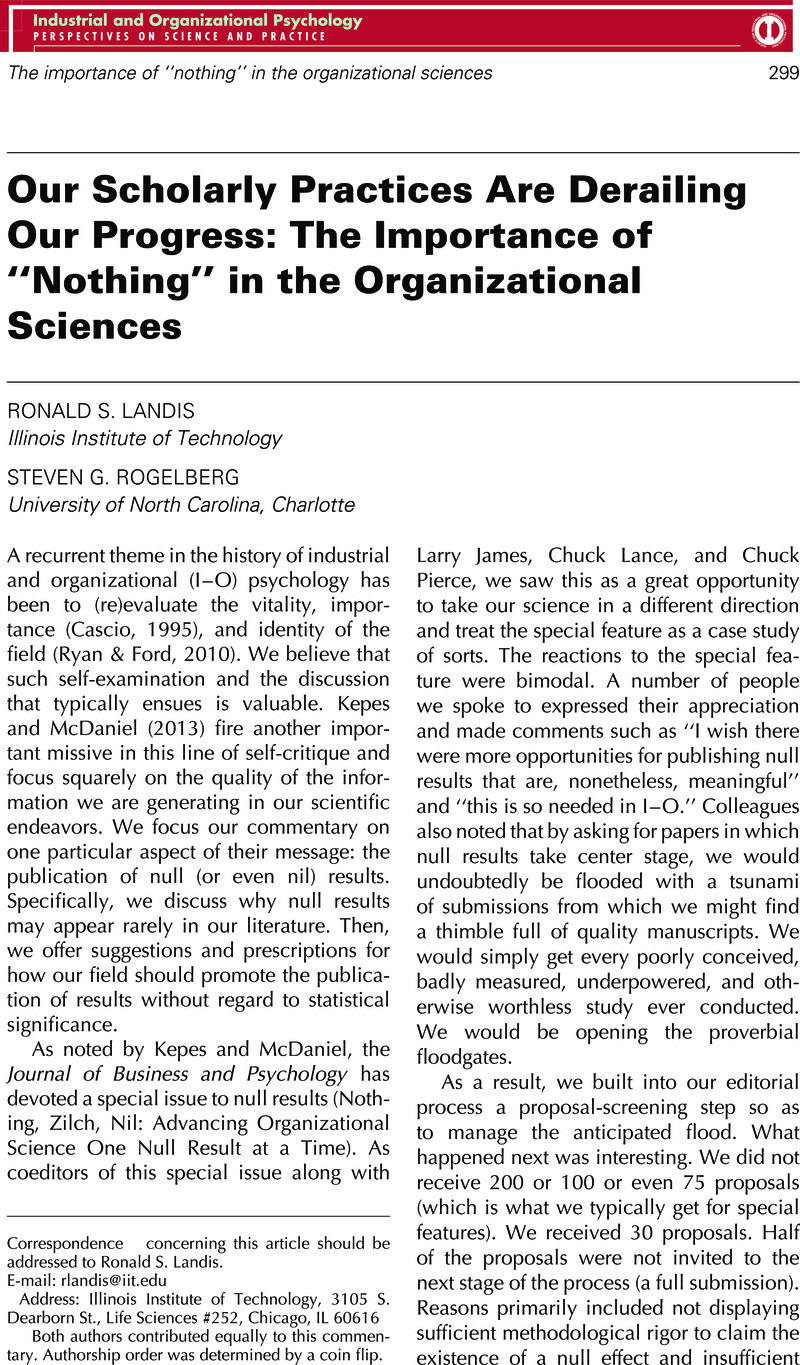Crossref Citations
This article has been cited by the following publications. This list is generated based on data provided by Crossref.
Landis, Ronald S.
James, Lawrence R.
Lance, Charles E.
Pierce, Charles A.
and
Rogelberg, Steven G.
2014.
When is Nothing Something? Editorial for the Null Results Special Issue of Journal of Business and Psychology.
Journal of Business and Psychology,
Vol. 29,
Issue. 2,
p.
163.
Davidsson, Per
2015.
Data replication and extension: A commentary.
Journal of Business Venturing Insights,
Vol. 3,
Issue. ,
p.
12.
Schwab, Andreas
and
Starbuck, William H.
2016.
A Call for Openness in Research Reporting: How to Turn Covert Practices into Helpful Tools.
SSRN Electronic Journal ,
Davidsson, Per
and
Gordon, Scott R.
2016.
Much Ado about Nothing? The Surprising Persistence of Nascent Entrepreneurs through Macroeconomic Crisis.
Entrepreneurship Theory and Practice,
Vol. 40,
Issue. 4,
p.
915.
Davidsson, Per
2016.
Researching Entrepreneurship.
Vol. 33,
Issue. ,
p.
247.
Kendall, Dana L
and
Campanario, Scott C
2016.
Honoring God through scientific research: Navigating the ethics of publishing with our students.
International Journal of Christianity & Education,
Vol. 20,
Issue. 2,
p.
133.
Byington, Eliza K.
and
Felps, Will
2017.
Solutions to the Credibility Crisis in Management Science.
Academy of Management Learning & Education,
Vol. 16,
Issue. 1,
p.
142.
McAbee, Samuel T.
Landis, Ronald S.
and
Burke, Maura I.
2017.
Inductive reasoning: The promise of big data.
Human Resource Management Review,
Vol. 27,
Issue. 2,
p.
277.
Hauser, Oliver P.
Linos, Elizabeth
and
Rogers, Todd
2017.
Innovation with field experiments: Studying organizational behaviors in actual organizations.
Research in Organizational Behavior,
Vol. 37,
Issue. ,
p.
185.
Harrison, Jeffrey S.
Banks, George Christopher
Pollack, Jeffrey M.
O’Boyle, Ernest H.
and
Short, Jeremy
2017.
Publication Bias in Strategic Management Research.
Journal of Management,
Vol. 43,
Issue. 2,
p.
400.
Schwab, Andreas
and
Starbuck, William H.
2017.
A Call for Openness in Research Reporting: How to Turn Covert Practices Into Helpful Tools.
Academy of Management Learning & Education,
Vol. 16,
Issue. 1,
p.
125.
Woznyj, Haley M.
Grenier, Kelcie
Ross, Roxanne
Banks, George C.
and
Rogelberg, Steven G.
2018.
Results-blind review: a masked crusader for science.
European Journal of Work and Organizational Psychology,
Vol. 27,
Issue. 5,
p.
561.
Grand, James A.
Rogelberg, Steven G.
Banks, George C.
Landis, Ronald S.
and
Tonidandel, Scott
2018.
From Outcome to Process Focus: Fostering a More Robust Psychological Science Through Registered Reports and Results-Blind Reviewing.
Perspectives on Psychological Science,
Vol. 13,
Issue. 4,
p.
448.
Taylor, Jamie
and
Collins, Dave
2019.
Shoulda, Coulda, Didnae—Why Don’t High-Potential Players Make it?.
The Sport Psychologist,
Vol. 33,
Issue. 2,
p.
85.
Brossoit, Rebecca M.
Crain, Tori L.
Hammer, Leslie B.
Lee, Soomi
Bodner, Todd E.
and
Buxton, Orfeu M.
2020.
Associations among patient care workers' schedule control, sleep, job satisfaction and turnover intentions.
Stress and Health,
Vol. 36,
Issue. 4,
p.
442.
Huebner, Lena-Alyeska
and
Zacher, Hannes
2022.
Effects of Action Planning After Employee Surveys.
Journal of Personnel Psychology,
Vol. 21,
Issue. 1,
p.
23.
Bowling, Nathan A.
Gibson, Anthony M.
and
DeSimone, Justin A.
2022.
Stop With the Questions Already! Does Data Quality Suffer for Scales Positioned Near the End of a Lengthy Questionnaire?.
Journal of Business and Psychology,
Vol. 37,
Issue. 5,
p.
1099.



